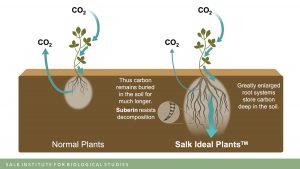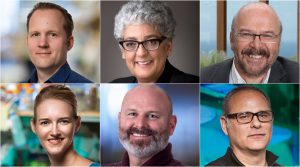
November 16, 2020
Salk’s Harnessing Plants Initiative is enhancing plants to capture and store more carbon to offset climate change
Salk’s Harnessing Plants Initiative is enhancing plants to capture and store more carbon to offset climate change

Click here for a high-resolution image.
Credit: Salk Institute
LA JOLLA—Salk’s Harnessing Plants Initiative (HPI) will receive $30 million from the Bezos Earth Fund to advance efforts to increase the ability of crop plants, such as corn and soybeans, to capture and store atmospheric carbon via their roots in the soil. This work will explore carbon-sequestration mechanisms in six of the world’s most prevalent crop species with the goal of increasing the plants’ carbon-storage capacity. It complements an ongoing HPI project focused on identifying genes for increased carbon sequestration in model plants and then utilizing those genes to enhance carbon sequestration in crops.
“The Bezos Earth Fund’s generous donation will help realize an exciting new HPI research program that significantly increases our scientific efforts towards the ultimate goal of utilizing crop plants to mitigate the effects of climate change,” says Salk President and Professor Rusty Gage.

Click here for a high-resolution image.
Credit: Salk Institute
Plants have immense potential to remove excess carbon from Earth’s atmosphere to help respond to our warming planet. The Bezos Earth Fund grant will enable Salk scientists to advance work in plant genetics, genomics, and biochemistry—and use the power of plant diversity—to develop global crops that will increase the amount of carbon removed from the atmosphere and store it deep in the earth’s soil. Members of the HPI leadership team include Salk faculty members Wolfgang Busch, Joanne Chory, Joseph Ecker, Julie Law, Todd Michael and Joseph Noel.
Office of Communications
Tel: (858) 453-4100
press@salk.edu
Unlocking the secrets of life itself is the driving force behind the Salk Institute. Our team of world-class, award-winning scientists pushes the boundaries of knowledge in areas such as neuroscience, cancer research, aging, immunobiology, plant biology, computational biology and more. Founded by Jonas Salk, developer of the first safe and effective polio vaccine, the Institute is an independent, nonprofit research organization and architectural landmark: small by choice, intimate by nature, and fearless in the face of any challenge.